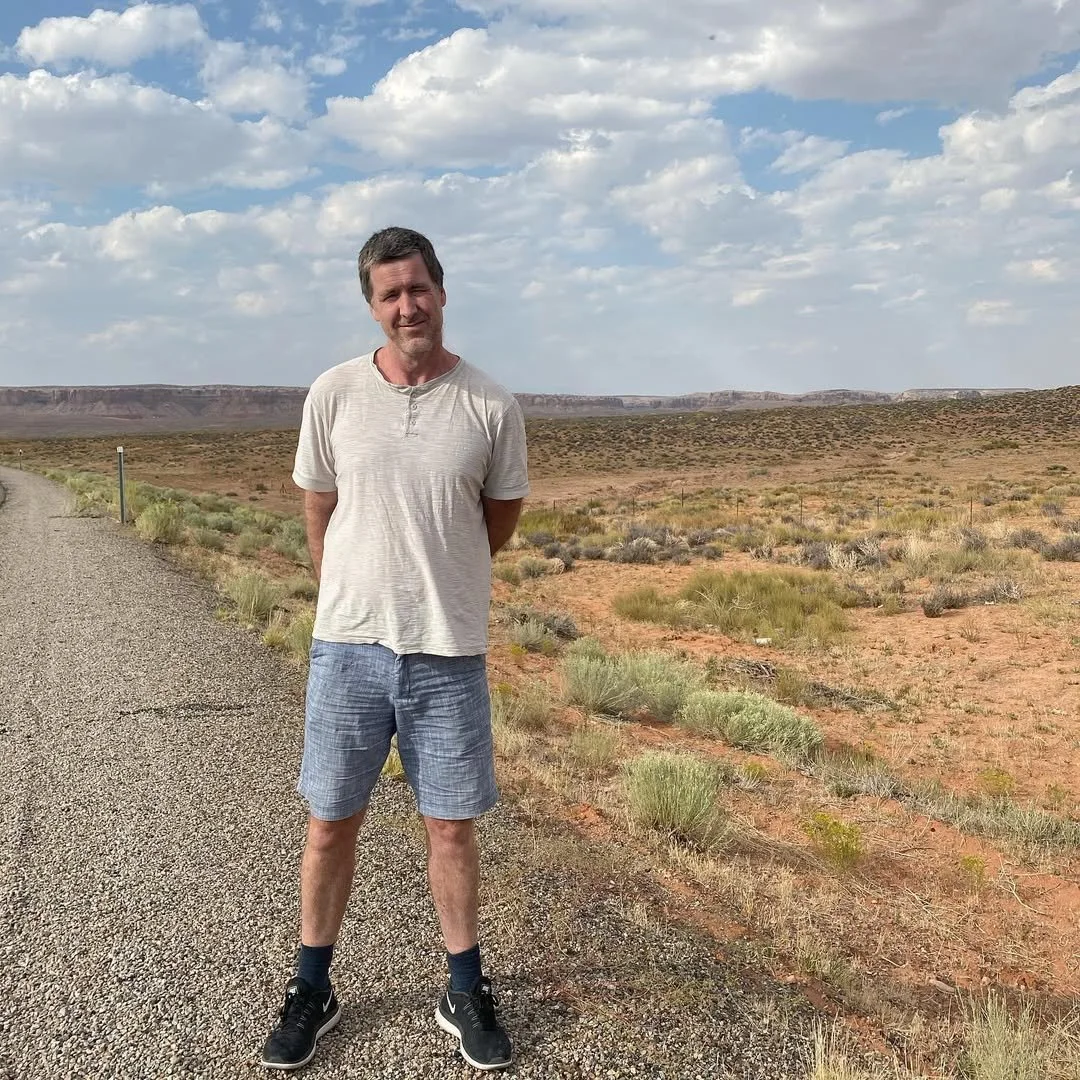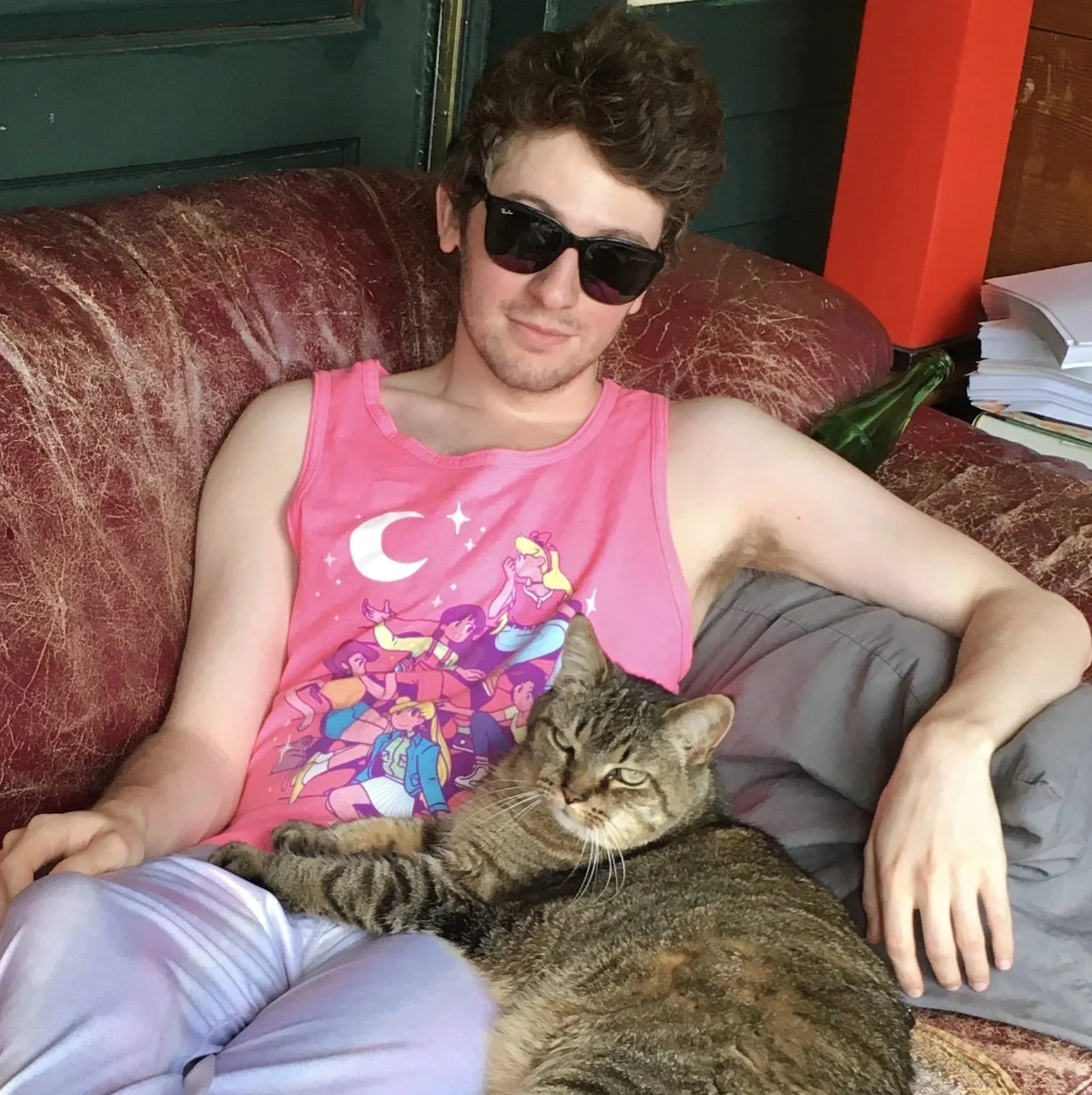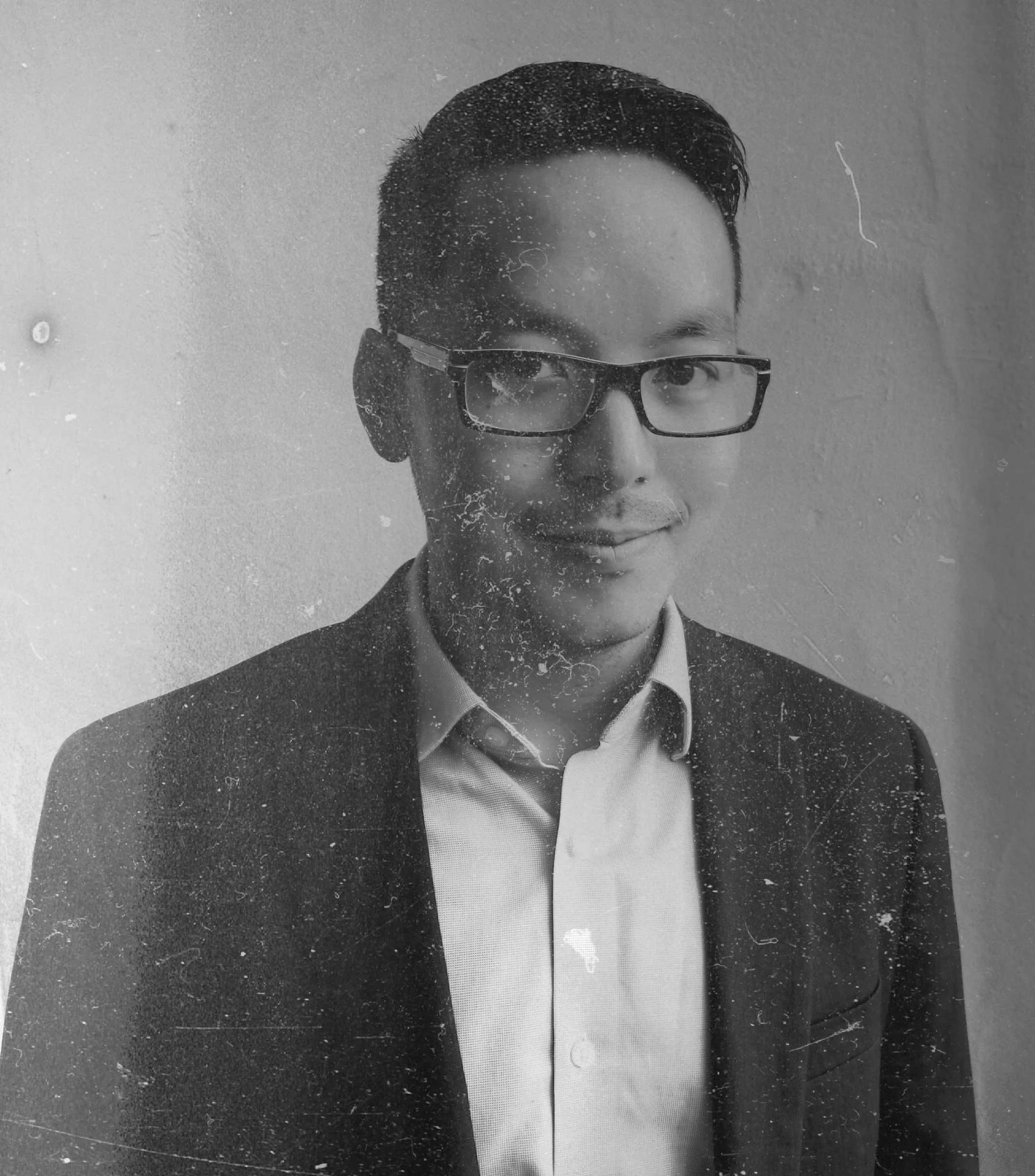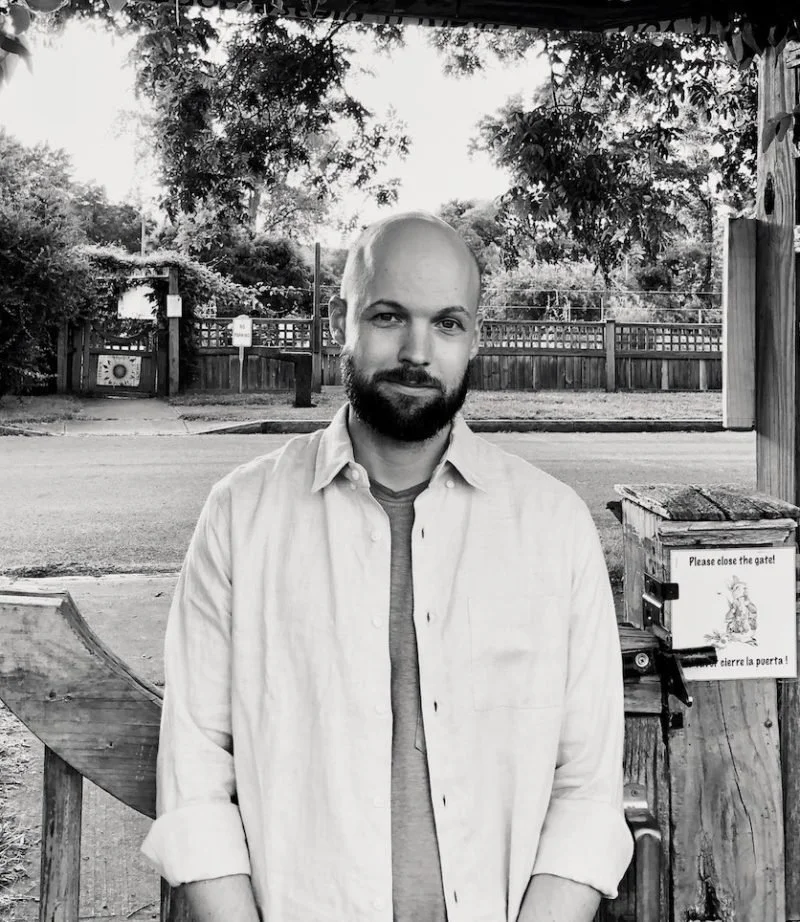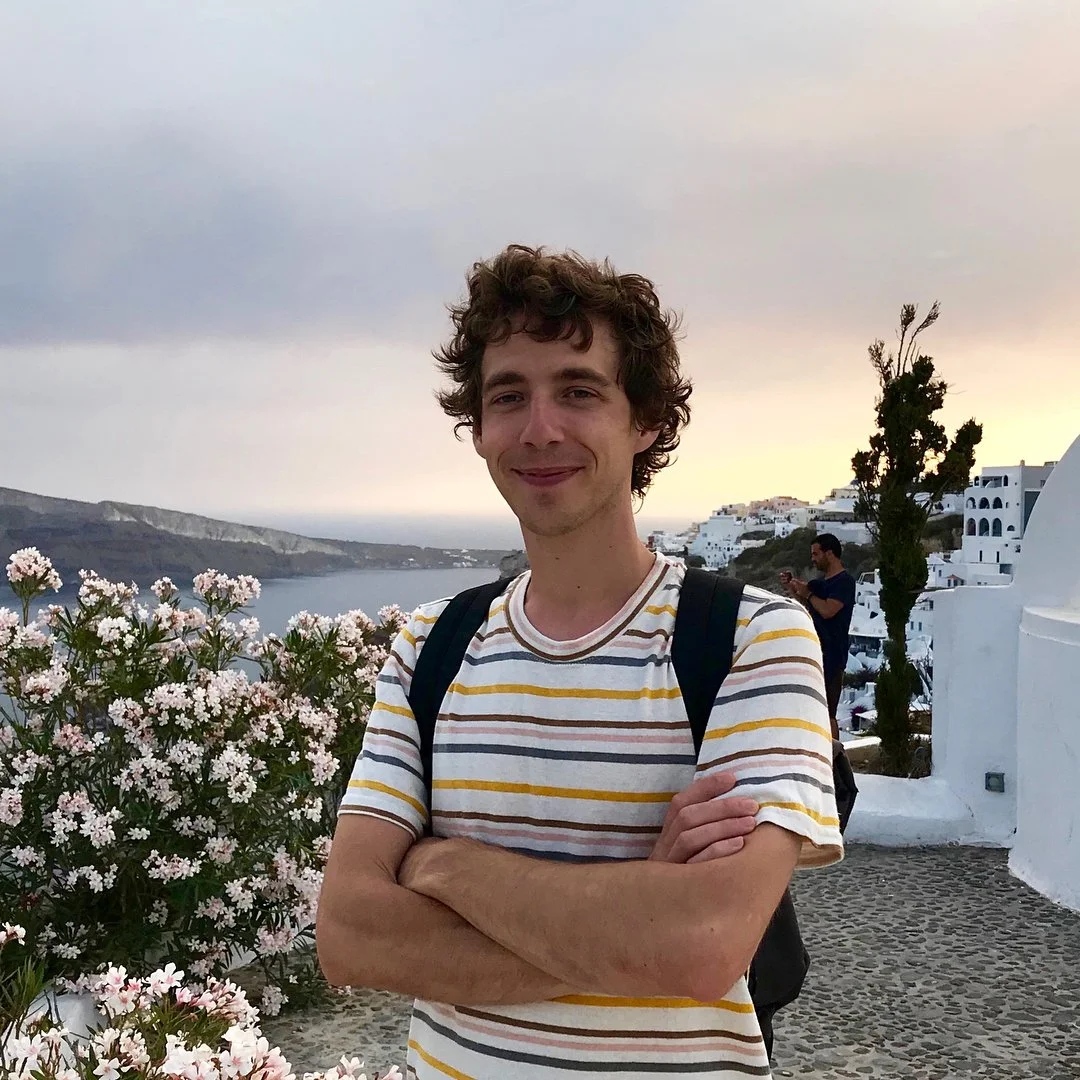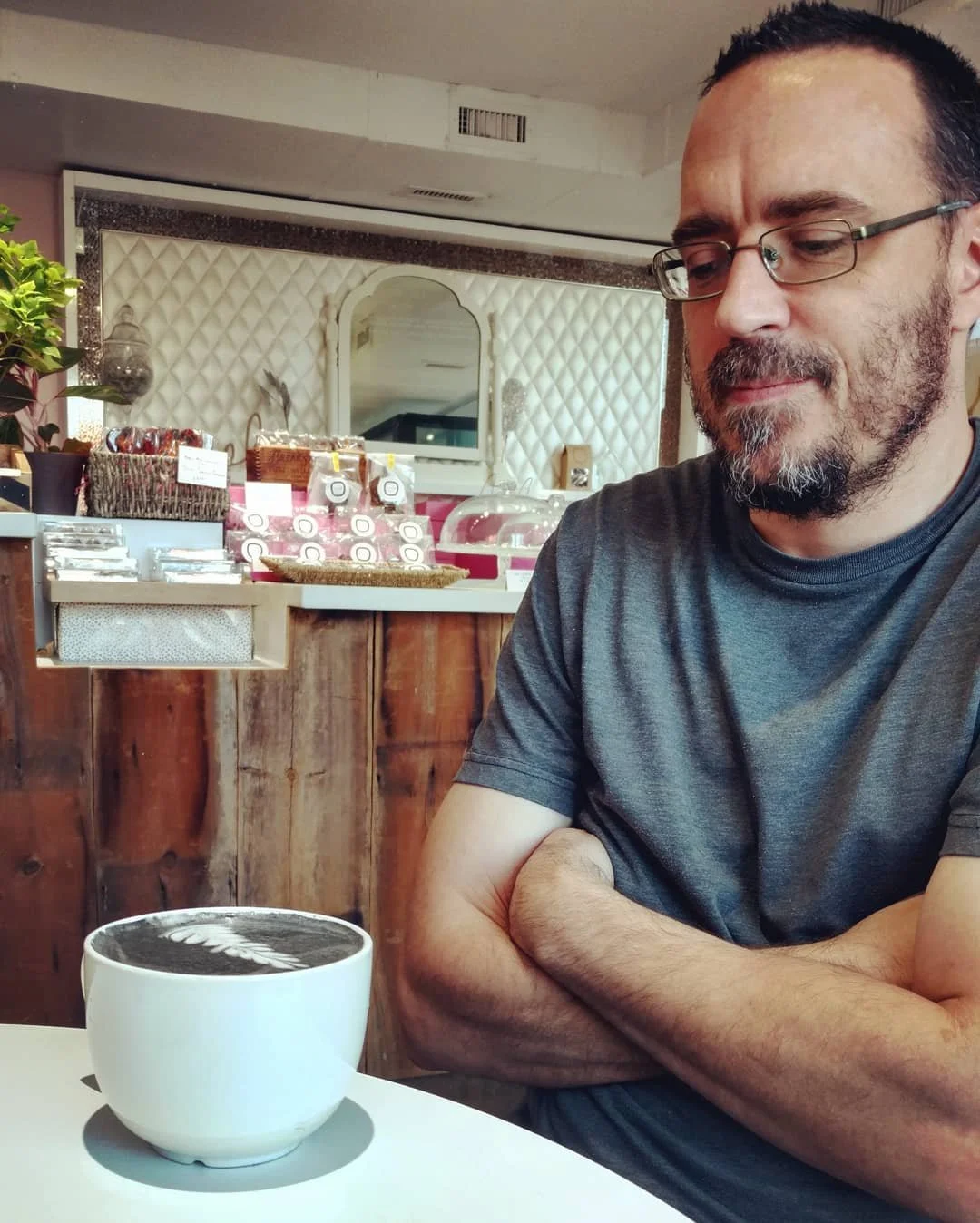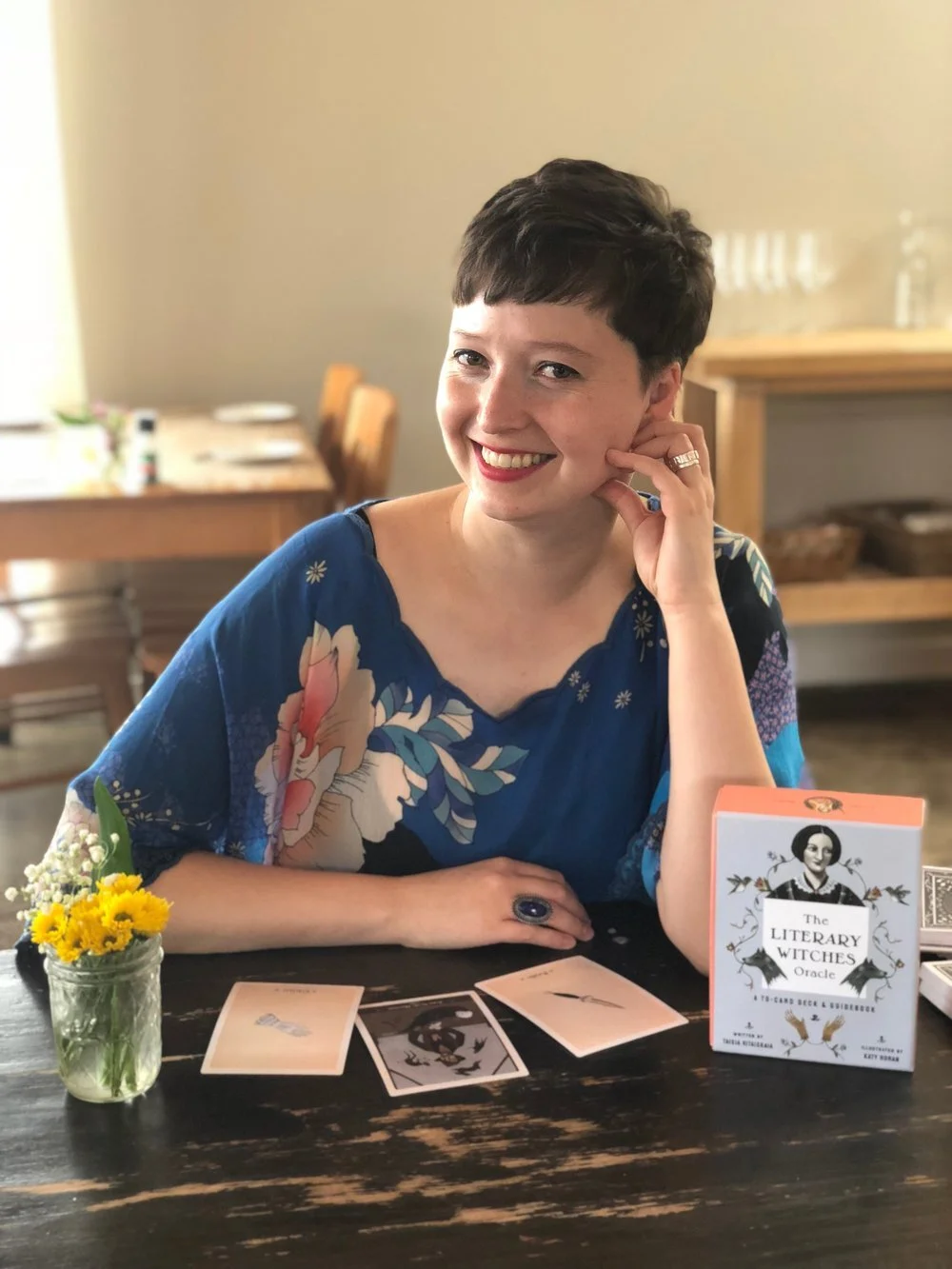Paul Cunningham is a writer, editor, translator, and educator. He is the author of the debut poetry collection The House of the Tree of Sores (Schism2, 2020), an interlingual rabbit hole of Swedish and English that weaves fable and reality and confusion and misdirection and mayhem. Like eating too much peyote inside of an IKEA. Like finding a black hole in the center of America. Simply put, it’s one of the most exciting and unique debut collections I've ever read.
Along with writing poems, Cunningham is also Managing Editor of Action Books and Content Manager of the Action Blog. He has translated (from Swedish into English) Helena Österlund’s Words (OOMPH! Press, 2019) as well as Sara Tuss Efrik’s Automanias: Selected Poems (Goodmorning Menagerie, 2016) and The Night’s Belly (Toad Press, 2016). I chatted with Cunningham via email about the juggling of these multimedia poetics, translation, music, and Nicolas Cage’s quiet masterpiece Pig.
via The House of the Tree of Sores (2020)
Congrats on your debut poetry collection! It's one hell of a grotesque rabbit hole and I really loved every page. I asked a similar question with poet Taisia Kitaiskaia, but I feel like many debut collections offer up an internal/external breakdown of the 'i' and the personal etc., but in this collection, I feel like it reads much more like a cohesive world-building fiction, where the 'i' is perhaps less important than the 'all' that surrounds. Care to elaborate?
Thanks! And, you’re right. The “I” is not necessarily the focus in The House of the Tree of Sores. If anything, American readers might (and should) experience frustration trying to relate to the “I” of these poems. I never intended the speaker—the assistant manager of the focal IKEA—to be likable. All I can say is: what if the “I” of these poems was a closeted Republican who grew up in a household of so-called “patriots”? I wanted readers to see this flawed speaker slowly unravel as he became infected by the ‘all’ that surrounds. I also hoped that readers would get invested enough to see if this speaker could be redeemed in the end. While it is true that I grew up in a veteran family, my parents never encouraged me to enlist in the army or anything. They never led me to believe that the army would be my only future. That said, in high school, I knew many boys (often from low-income families) who were raised to believe there was “nothing more honorable” one could do in this world—in the one life a person is given—than to die “for one’s country.” Republicans’ so-called “pro-life” views continue to perplex me! This might sound absurd or unbelievable, but after a high school instructor exposed me to Althusser’s Ideology and Ideological State Apparatuses, it’s one of those texts that changed how I looked at the world. Everything one needs to actually understand abusive concepts like family, religion, and education exists in that one indelible book!
You've released numerous chapbooks since 2010. Did you always see The House of the Tree of Sores as your 'debut'?
Yes. For years, it was the only manuscript I submitted to presses and open readings. At the time, I felt it was my best work. Still might feel that way. It was a finalist in numerous contests and open readings before Gary J. Shipley published it via Schism Press. Trying to get an interlingual book of poetry published can be kind of demoralizing. You start asking yourself dumb questions like, Will that even sell? I knew if Cecilia Vicuña could get a book as challenging and dynamic as Saborami published, then it could happen for me! Saborami was undeniably a motivating factor when I was writing The House of the Tree of Sores. And I am grateful. Gary was the one publisher who was willing to take a risk on an interlingual book of poetry and I remain forever grateful!
When did you begin/end this collection? Was the concept of interlingualism something you wanted to include from the start? Or did the Swedish come into later drafts?
I started writing The House of the Tree of Sores during my MFA (2013-2015) at the University of Notre Dame. I continued to edit it through 2018, I think. I was writing it around the same time I started seriously translating Swedish for the first time. I didn’t quite take my translatory efforts seriously until I studied with Johannes Göransson at Notre Dame. That’s the reason I applied to the program in the first place—to work with Johannes. Prior to meeting him, I had been told by certain established translators that I “had no business” translating Swedish if I wasn’t actually a Swede. One Spanish-language translator actually told me that I could not “truly” translate Swedish until I visited Sweden and stood on Swedish soil. In summary, Johannes was the first writer I met to actually say “Yes” instead of “No” to a prospective translator’s question: Should I try to translate poetry? There were many, many “No’s” before I met Johannes. “Yes,” said Johannes. “I think you should do this,” said Johannes. “You should translate. I will help you.”
via Metro-Goldwyn-Mayer (2010)
For lack of a better phrase, do you often see yourself working with book projects? Or project-length books? I think Victoria Chang was the poet who didn't like that phrase, but I don't know a better suggestion other than 'not simply a collected works, but a debut with a strong through-line'.
Yes, I absolutely think in terms of projects. I am an unapologetic maximalist. Some heroes include Kara Walker, Matthew Barney, Rashid Johnson, and David Altmejd. I also appreciate how at times some of David Lynch’s paintings feel more like sculptures (see Boy Lights Fire). In terms of scale, I want my poems to at least attempt to reach the scope of those artists. I think “the page” can be a limiting way to approach poetry. I think about performance, ekphrasis, and more. Who is to say that your latest poetry book launch couldn’t also be a gallery exhibition? When it comes to poetry, I think in terms of projects and sequences instead of singular titled poems. A poetry instructor once told me a poem is only as good as its title. Which is bullshit.
While your book is still a newborn in the literary world, can I ask what you're currently working on?
I’m excited to announce that Schism Press will soon publish my second full-length poetry collection, Fall Garment, in 2022. It was most recently a finalist for the 2020 Tarpaulin Sky Book Award. Fall Garment is inspired by the Reagan administration’s response to America’s AIDS crisis; Sir Thomas Browne’s Christian burial methods; fashion designer Thom Browne’s contemporary menswear; Richard Strauss’s “Death and Transfiguration” tone poem; and Luchino Visconti’s 1971 film Death in Venice. You can read excerpts from Fall Garment in Dream Pop Journal, Baest: a journal of queer forms and affects, and Tarpaulin Sky.
via DIAGRAM
I asked briefly about translation, but you also manage Action Books and Action Blog. What outside work is grabbing your attention as of late? What poets/translators are turning your head? (or perhaps twisting off your head)
Are you referencing Dickinson? (“If I feel physically as if the top of my head were taken off, I know that is poetry.”) I’m sure someone out there will think that Dickinson’s metaphorical language is too violent. LOL. Poets have become so sensitive, lately. It’s extremely entertaining, but also scary. As far as work outside of Action Books goes, I’ve lately really admired the following: Yi Sang: Selected Works (Wave Books, 2020); Jake Syersak and Pierre Joris’ translation of Khaïr-Eddine’s Agadir (Diálogos); Olivia Lott’s translation of Lucía Estrada’s Katabasis; Bora Chung’s Cursed Bunny (Honfard Star, 2021); Lim Solah’s Grotesque Weather and Good People (forthcoming from Black Ocean). Eagerly awaiting my copy of Madison McCartha’s Freakphone World. No one else in poetry is doing what Madison is doing. They are a genius.
You're often sharing great music and movies on Twitter so outside of poetry and the literary world, what albums / movies have captivated you in recent months?
Oh? Thanks for noticing. I often delete such things after I tweet about them because social media isn’t a good thing? I feel like people use Twitter to go looking for reasons to make themselves unhappy. For example, I tweeted that I was happy that ABBA was making music again a few nights ago and someone I don’t know tweeted, “I’m happy I don’t follow you.” We should probably all unplug soon and preserve our mental health, but we never do. As far as recent albums? I didn’t like Kanye West’s new album. Loving everything Lil Nas X is doing lately. The new-ish albums I listened to the most during quarantine was Kylie Minogue’s DISCO, Run the Jewels’ RTJ4, and Pet Shop Boys’ Hotspot. I also discovered that I really love Oneohtrix Point Never’s Garden of Delete.
Grateful to Nikki Wallschlaeger for her recommendation of Wesley Willis. “Rock & Roll McDonald’s” is my new anthem.
So far Pig has been my favorite film of 2021, but I’m also looking forward to Lamb. Leos Carax’s Holy Motors is one of my favorite films of all time. And Sparks is one of my favorite bands of all time. So, of course, it took me some time to admit that I don’t think I actually loved Annette quite as much as I thought I was going to. But it was so good to see Marion Cotillard in a film again! But why does she always have to die or be brutalized? Can Marion’s character just live for once? And that guy from the Big Bang Theory really surprised me! He was maybe the best part of that film? The Candyman reboot was also very satisfying, but I feel like Tony Todd was severely underused. Those opening credits though? So stunningly haunting! Felt reminiscent of the feeling evoked by the hypnotic red-blue-red-blue of Kubrick’s opening credits for A Clockwork Orange.
Patiently waiting for Dune.
via The Spectacle
What does your writing process / editing process look like? How do you approach the blank page? How do you know when you're done?
Outlines. I create large, wall-length outlines. Notebooks are too limiting. I take up a lot of physical space when I’m planning something. It’s something I started doing after I saw Lars Von Trier do it in some documentary footage from Antichrist (I think?). He would literally storyboard across the walls of his office. It really works for me. I also like to write on the floor sometimes.
With your debut collection (acronym THOTTOS which is awesome), did you have numerous pages/poems of this world that didn't make the cut?d
Oh, it’s funny that you point out the acronym. There was a brief period of time where Gary kept saying “THOTTOS” in emails and I thought it was his fun personal slang for “thoughts.” THOTTOS? Took a few emails before I realized that it was the acronym for my book title. In hindsight, I should have perhaps just called the book THOTTOS.
And yes. Many, many cuts were made to THOTTOS before I turned in the final manuscript to Gary. Maybe not whole pages, but many lines were altered for fear of overwriting. Which is a weird thing to be conscious of as someone who celebrates excess. But when excess starts to hinder the sound and pacing of your poems, I think it does pose a problem.
If you can, provide a photo of your workspace or describe with words. What are some essentials while you create?
Irish Breakfast or Green Tea is my early morning go-to. Recently, I’ve found I really like Tazo Energize. When it comes to coffee, I opt for a cortado. In recent years, I’ve been more of an early morning writer. I also don’t really drink when writing. Maybe an occasional whiskey, but I don’t like to write under the influence. As far as editing goes? Sure. I might drink and edit, but I never really drink and write. It just doesn’t work for me.
For this ongoing author interview series, I'm asking for everyone to present a writing prompt. It can be as abstract or as concrete as you choose.
Bring a camera to a room with a screen door or a screen window. (A cell phone camera will suffice.) It might require some patience, but wait for an opportunity to photograph unsuspecting passersby. You can only photograph the passersby behind the screen. Write a poem that responds to these images of new, fragmented bodies. What does the screen reveal about the bodies? How does the screen distort them? What colors and shapes emerge? What truths are revealed by the obstruction of the screen? Who do these strangers become?
In closing, do you have any advice for early writers? Or rather, what's something you would have liked to have known when you first started taking your writing seriously?
Sure. Even the most established poets—poets who might make publishing seem effortless—are most likely receiving far more rejections than you could ever imagine. I know so many talented young poets who have given up on themselves because they didn’t publish a first book by a specific age or because they thought they couldn’t exist as a poet outside of academia. These are very limiting (and, frankly, unhealthy) ways to approach poetry.
Every semester I teach Creative Writing, I show my students my actual Submittable history. I show them every rejection I have ever received. Projected on a classroom wall. “Rejected. Rejected. Rejected. Rejected. Rejected. Rejected. Rejected.” I have nothing to hide. I am not perfect. I want them to know that. I sugarcoat nothing. I want my students to be as strong-willed and resilient as possible. The problem with academia today is instructors who lie to their students. Instructors who behave like helicopter parents. If you actually care about your students, you should tell them that at some point they will probably fail to impress an editor. They will fail to publish a poem. They will, at some point, fail. Failure, like it or not, is a part of being human. It is a part of growth and development. My pedagogy doesn’t involve participation trophies. It is okay to be rejected by a literary journal. It is important for you to let your students know that rejection is okay. Normal, in fact. That they can always try again. True, perhaps, they might have failed in the eyes of a certain editor, but at least you have taught your student to have the maturity to recognize that their aesthetic simply doesn’t fit the vision of whatever journal rejected them. Autonomy is important to me. That is what I teach, who I teach. Hard truths and human beings.
Any final thoughts / words of wisdom / shout-outs? Thank you!
Thank you so much for these thoughtful questions! A shout-out? I’m incredibly excited for Jake Syersak’s next book, Mantic Compost (forthcoming from Trembling Pillow Press).
For some words of wisdom, here’s my favorite part of Jake’s VORTEX(T):
“frontier is a stupid word it’s true after all our dreams no longer
deserve us
swimming like out-of-control
semi veers a freeway toward its yet-anatomy (yes
to vulnerability
like that
by the way) like the rhyme of tree
with me the vortex churns for instance the eyes which sift”








